15th Jun 2022
11 Tips On How To Take Your Thyroid Medication Properly
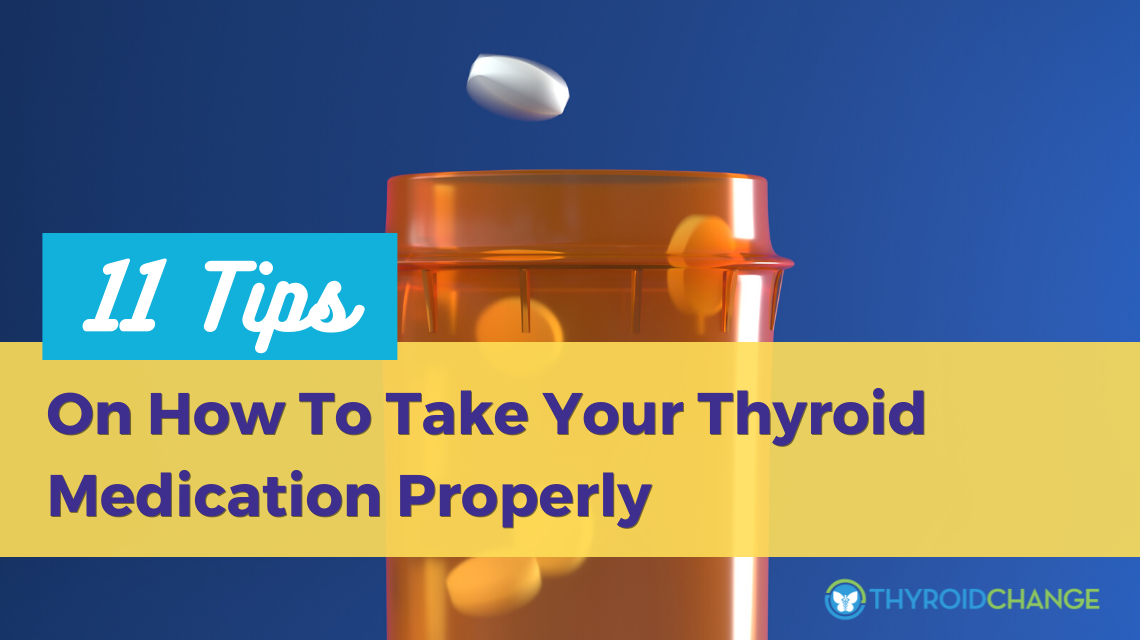
What You'll Learn:
- Current types of thyroid replacement medication
- Why it’s important to follow recommendations on taking thyroid medication properly
- 11 recommendations on how to get the most out of your thyroid replacement treatment
- Other points you should be mindful of when taking thyroid medication
- Where to find help
Are you taking your thyroid hormone replacement medication correctly? Did you know that how and when you take your thyroid medication can affect your ability to absorb the necessary hormone properly? In the article below, I investigate the factors that contribute to correctly (or incorrectly) taking thyroid replacement hormone and on how thyroid patients can get the most out of their medication.
Have you suffered from brain fog, unusual fatigue, unexplained weight gain and severe hair loss, and ended up being diagnosed with hypothyroidism? Are you at your doctor’s mercy now to take your thyroid medication correctly?
If yes, you are not alone.
1 in 20 individuals in the United States have hypothyroidism and are on thyroid medication for their condition. [1] Further research reveals that 14 million individuals in the U.S. have Hashimoto’s thyroiditis, making it the top cause of hypothyroidism in America. [2]
The statistics clearly indicate how prevalent hypothyroidism is in our society and how many people are likely taking medication for it.
But did you know that as many as 50% of hypothyroid patients don’t take their thyroid medication properly? And did you know that many practitioners fail to educate their patients on how to take their thyroid medication?
This article delves into eleven important tips on how to take your thyroid medication correctly that often go overlooked.
What Are The Common Types of Thyroid Medication?
First, let’s discuss common types of thyroid medication. Thyroid medication comes in 4 different types in various brand names and generic forms.
Types of thyroid medication include the following:
- T4 medication (ie. levothyroxine, Synthroid, Tirosint)
- T3 medication (ie. liothyronine, Cytomel)
- T4/T3 combination methods (as separate tablets or combined together with compounded medication)
- Natural desiccated thyroid medication (ie. Armour, NP Thyroid, Erfa)
Depending on a patient’s unique thyroid needs of thyroid hormone replacement, any one or combination can be prescribed. If a patient is having difficulty converting the T4 into the more active T3, natural desiccated thyroid medication and T3/T4 combination methods are often used [3]
There may also be underlying conditions preventing some patients from properly absorbing or converting thyroid hormone.
If you believe you are on the correct dose of levothyroxine, liothyronine, or natural desiccated thyroid medication, there are certain things you can do to maximize the results. Read on.
Why Is It Important to Take Thyroid Medication Properly?
The thyroid is a small gland in your neck, but it has enormous effects on your body. A hypo-functioning thyroid has an effect on every organ, tissue, and cell of your body. So, not taking thyroid replacement therapy properly can impose serious consequences. What could this result in?
- Worsening hypothyroid symptoms: Lack of thyroid hormone in the body leads to persistence and, later, deterioration of the signs and symptoms of thyroid deficiency.
- Increased risk of developing other diseases: Untreated hypothyroidism can increase your risk for comorbidities, including heart disease, high blood pressure, high cholesterol.
Therefore, taking thyroid replacement is of utmost importance in order for your body to function properly. Following the tips below can help you get the most out of your medication.
How to Take Your Thyroid Medication Properly
1. Get The Same Type of Thyroid Medication from Your Pharmacy Every Time
Thyroid patients can be extremely sensitive to their medication changes, and not all thyroid medication is created equal.
Changing your thyroid medication type or brand might lead to a change in your symptoms, for better or for worse. Healthcare providers recommend using the same brand for your thyroid therapy if that provides a resolution of your hypothyroid symptoms.
For example, T4 (levothyroxine) is not an equal replacement for natural desiccated thyroid medication.
Additionally, if given a generic as a replacement for a brand name drug, there may be different inactive ingredients or fillers that you may be sensitive to which can affect how your body utilizes the thyroid hormone.
Ask your healthcare professional to write the prescription as “brand necessary,” or “no substitutions“, or “dispense as written”.
Furthermore, be sure to thoroughly read the label of your medicine when you receive it. When you are at the pharmacy, double-check these items:
Pharmacy Checklist:
✓ Check that you are getting the correct prescription and dose that your doctor ordered (no substitutions)
✓ Be sure that you are getting the right number of tablets for the month
✓ Be sure that the medicine is well within its expiration date
✓ Check to see if it’s generic or name brand. If you’re not already getting a generic drug, you may want to avoid a generic form if you were previously taking name brand. The medication may contain other components or fillers in the generic that are dissimilar and can affect the rate of absorption. [4,5]
2. Store Thyroid Medication Away from Light, Heat, And Damp Areas
Drugs should be kept in proper storage so that they remain effective. After you bring your thyroid hormone replacement medication home, be vigilant to store it properly.
Keep them at the right temperature. Generally speaking, thyroid medicine should be stored at room temperature.
They should not be exposed to sunlight and they should be kept away from heat.
Finally, do not place your medication in damp areas, such as a shower room or bathroom, as the tablets might dissolve and affect your dosage. [6]
3. Be Consistent – Take Your Medicine at The Same Time Every Day
Take your medicine daily on time, without forgetting.
Many people miss their dose which is to be taken at the same time daily, and then decide to just take it the next day.
Don’t do this. Missing a thyroid dose for even for one or two days can drastically change how you are feeling. [7]
It’s best to take it as soon as you remember that you missed your dose.
To solve this potential problem, take your medication with some other activity that you do every day (except for eating and drinking coffee).
For example, you can make a habit of taking your dose first thing when you wake up in the morning. Perhaps, keep the medication bottle next to your nightstand. You may also want to set the alarm or reminder on your phone, or buy a daily pill sorter.
4. Take On an Empty Stomach With Plenty of Water
The absorption rate of thyroid hormone may be affected by food as it may bind with the drug, leading to decreased access to intestinal absorption sites. This alters the rate of thyroid hormone dissolution. [8]
Take your thyroid medication with a full glass of water and take it either in the morning without eating anything, or just before going to bed on an empty stomach, at least 30-60 minutes away from eating.
Some people take it immediately before they go to bed because of the possibility of better absorption at night (ie. no interference of food or other supplements). On the other hand, others may not do well with this option as they may feel more awake at bedtime and prefer to take it in the morning.
Taking it with enough water is important because you want your thyroid medication to fully dissolve and not get lodged and moved out with your next bowel movement!
Keep in mind that certain food, supplements, and medications have special considerations and should be taken 4 hours or more from thyroid medication. [9] More on that below.
5. Be Aware of Certain Food Interactions
You should pay particular attention to the following foods when taking thyroid hormone replacement medication since their minerals, ingredients, or content could affect the hormone absorption:
- Coffee: DO NOT take your thyroid medication with coffee or caffeine. Coffee can impact the absorption of thyroid hormone since it speeds up digestion and bowel movements. In studies, coffee reduced the body’s absorption of thyroid medication by 36%. It’s recommended to wait at least 1 hour before forms of caffeine. Some experts recommend waiting as much as 4 hours. [10]
- Food with High Calcium: This includes calcium-fortified orange juice, certain cereals, milk, and yogurt. As mentioned below, calcium should be taken at least 4 hours away from thyroid medication.
- Soy-based foods: Soy is a healthy source of protein and soy examples include tofu, edamame, and miso. However, eating frequent amounts of soy could reduce thyroid hormone production because of its antithyroid effects.
- Grapefruit: Grapefruit and grapefruit juice interferes with the metabolism or absorption of several prescription drugs, including thyroid medication. It alters a specific enzyme in the intestines responsible for the metabolism and absorption of medication.
- Fiber: If you suspect that you are getting an above-average amount of fiber in your diet, get your thyroid hormones tested regularly to ensure optimal levels. Taken too close together with thyroid medication, fiber can force thyroid medication to exit the body before it is properly absorbed.
- Large quantities of raw goitrogenic foods: These include cauliflower, broccoli, kale, and more which can have antithyroid effects when consumed raw and in large quantities. While eating such vegetables regularly is healthy for thyroid patients, just be mindful of “above average” amounts of their raw form. Cooking goitrogenic foods is recommended since it lowers a food’s goitrogenic potential. [11]
6. Space Supplements Apart From Your Thyroid Medication
You should avoid taking thyroid hormone replacement before or after supplementation.
The general rule of thumb is to take most supplements about 30 to 60 minutes away from thyroid medication. However, be extra cautious when taking calcium, iron, and magnesium, in addition to multivitamins and fortified cereals.
These supplements should be taken a minimum of 4 hours apart from thyroid medication:
- Calcium: Supplements of calcium, such as calcium acetate, citrate, or carbonate, should be taken at least 4 hours before or after thyroid hormone. Calcium interferes with hormone medications by preventing them from being fully absorbed into the bloodstream.
- Iron: Many thyroid patients are deficient in iron, and iron is essential for thyroid hormone conversion and utilization of iodine. But when iron is taken near the time of thyroid medicine, it can bind to thyroid hormones which does not allow proper functioning of the hormone. Whether you solely consume iron or it is part of a multivitamin complex, wait at least 4 hours before or after taking your thyroid dose.
- Magnesium: Many thyroid patients are deficient in magnesium as well, and it’s an important mineral for well-being. Be aware that magnesium can impair the absorption of thyroid medication, so the general recommendation is to wait 4 hours before or after your thyroid dose. Because of its relaxing properties, many patients find that taking magnesium at bedtime is helpful.
Here are other supplements to be mindful of:
- Biotin: If biotin is taken one hour after taking thyroid medication, it should not significantly affect the absorption of thyroid hormone. However, it may cause interference with thyroid testing and produce abnormal results. The general recommendation is to simply stop the biotin 1-2 weeks prior to thyroid testing, then resume after testing.
- Vitamin C: This supplement can actually enhance thyroid absorption. This means that taking thyroid hormone with this vitamin can increase its absorption and may have an overdose effect, leading to hyperthyroid symptoms. Take vitamin C at least 4 hours away from thyroid hormone replacement.
- Iodine: Iodine and kelp supplements can be used when there is an iodine deficiency, and having an iodine deficiency can cause or worsen a thyroid condition. Your thyroid is very sensitive to iodine, and by taking an iodine supplement, this could potentially interfere with your thyroid medication. It’s recommended to work with a good integrative doctor who can guide you through iodine supplementation.
7. Be Aware of Common Drug Interactions
Several over-the-counter and prescription drugs can affect thyroid hormone absorption. Therefore, it is essential to inform your doctor if you are taking any medications to avoid potential problems, and aim to take them at least 4 hours from your thyroid medication.
Common drugs that can impact absorption or have negative interactions when taken with thyroid medication:
- Antacids – Mylanta and Tums, for example
- Proton pump inhibitors (PPIs) – Prilosec (omeprazole), Prevacid (lansoprazole), and Nexium (esomeprazole)
- Diabetic medications – Insulin and oral hypoglycemic drugs
- Serotonin-reuptake inhibitors (SSRIs) – Such as Zoloft (sertraline) and Celexa (citalopram)
- Tricyclic antidepressants – Elavil (amitriptyline), Sinequan (doxepin), and Norpramin (desipramine)
- Birth control pills and hormone replacement therapy
- Certain antibiotics – Rifampin and Cipro (ciprofloxacin)
- Certain cholesterol-lowering drugs – For example, Questran (cholestyramine) and Colestid (colestipol)
- Blood thinning medication – Coumadin (warfarin) or Heparin
- Lithium – A medication for bipolar disorder
- Activated Charcoal – a binder
Several other drugs can also interact with thyroid hormone, including Welchol (colesevelam) for heart problems, and Fosrenol (lanthanum) and Renagel (sevelamer) for kidney disease. [12, 13]
There are many other drugs that could interact. Always consult with your pharmacist regarding the medications you are taking.
8. Be Aware of Medical Conditions That Can Affect Absorption
Several medical conditions affecting the gut and liver may also impact thyroid hormone absorption. Some common examples are as follows:
- Celiac disease
- Crohn’s disease
- Irritable Bowel Syndrome (IBS)
- Gastroesophageal Reflux Disease (GERD)
- Small Intestinal Bacterial Overgrowth (SIBO)
- Malabsorption conditions (leaky gut)
- Helicobacter pylori infection
- Lactose intolerance
- Liver disease
- Autoimmune gastritis
- Pancreatic diseases
In such cases, thyroid hormone medication may be prescribed at a higher dose.
Also, a liquid or gel cap form of T4 thyroid medication (e.g. Tirosint) is usually absorbed more quickly than standard tablets. Ask your doctor or pharmacist about this option. [13]
9. Be Aware of Sensitivity to Fillers and Inactive Ingredients
You may be sensitive to certain fillers or inactive ingredients used in thyroid medication. Avicel, acacia, and microcrystalline cellulose can be issues for some sensitive thyroid patients.
Options for those who are very sensitive are to look into getting the thyroid medication through a compounding pharmacy and ask for a simple, well-tolerated filler such as rice flour or sucrose.
10. Look Out for Worsening Adrenal Fatigue Symptoms
Consider this analogy: Think of thyroid hormone as the “gas” to a car and cortisol from the adrenal glands as the “oil”. If there is not an optimal amount of “oil” (cortisol), and you give the car “the gas” (thyroid hormone), you will only rev the car and not go anywhere. [14,15]
This is how it may feel when you have unresolved adrenal fatigue while attempting to take thyroid medication.
You could feel more “wired and tired” or have symptoms of feeling revved or agitated, without feeling the benefits of thyroid replacement hormone.
If you feel these symptoms and suspect adrenal fatigue (cortisol levels that are not optimal throughout the day), consider the help of an integrative practitioner listed on this site and discuss the possibility of adrenal fatigue.
You may also look into the details on adrenal testing and adrenal supplements. .
11. Other Points To Be Mindful Of
Also, remember these following points when on thyroid hormone replacement:
- Give the medication several weeks to have its full effect. Treating hypothyroidism is often not a quick fix. T4 thyroid hormone takes 4-6 weeks to build up in your system, while T3 is more short-acting. There will often be dose adjustments to get you to your optimal thyroid hormone levels. Read more about optimal thyroid levels here.
- Look out for common hyperthyroid symptoms (signs of being overmedicated on your thyroid medication). Let your doctor know immediately if you feel prolonged heart racing, muscle aches or weakness, feelings of agitation or aggression, a shaky feeling, or excessive sweating.
- Don’t stop taking your thyroid medication suddenly. This could cause a sudden return of hypothyroid symptoms, including changes in mood. Always speak with your doctor if you feel you need to reduce or increase your dose.
- Be aware that you may need a different form of thyroid medication. Many patients need a combination T3/T4 approach with either a levothyroxine/liothyronine method, or through natural desiccated thyroid medication, which contains all the thyroid hormones.
______
Final Thoughts
When you have a thyroid condition, it is essential that you visit your doctor regularly to get a full thyroid panel to ensure that your thyroid hormones are in check.
If you still don’t feel well and need assistance with your thyroid journey, or if you’re looking to find a new doctor, I have several recommendations:
- Read the important tips and visit the patient-recommended doctor lists on ThyroidChange on how to find a good thyroid doctor.
- If you can’t find a good thyroid doctor nearby, there are some excellent telemedicine options that provide complete care for thyroid patients with a comprehensive, integrative approach. I can fully vouch for the options listed there.
- If you need assistance, support, or information on where to start, I offer 1-on-1 coaching as a thyroid patient advocate to guide you in the right direction, to help you find an excellent doctor, and to explore possibilities.
- Remember, you are not alone and you can feel better!
Finally, check out the video below from Dr. Westin Childs, DO where he explains many of the tips above in further detail.
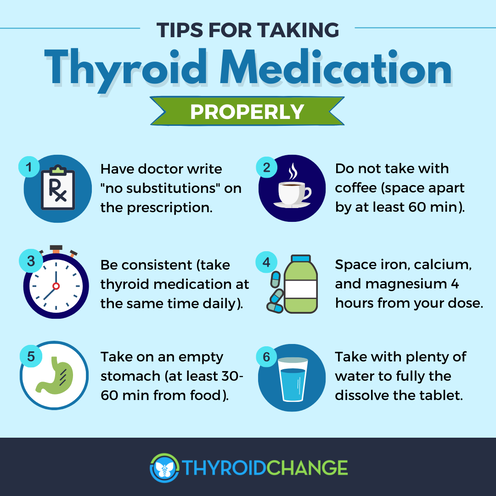
References:
- Hypothyroidism (Underactive Thyroid). NIH. Mar 2021.
https://www.niddk.nih.gov/health. -information/endocrine-diseases/hypothyroidism - Hashimoto’s Thyroiditis: Information for Patients page. The American Association of Clinical Endocrinologists (AACE). http://www.aace.com/pub/thyroidbrochures/pdfs/Hashimoto.pdf. 2005. Accessed May 25, 2010.
- McAninch E A, Bianco A C. The Swinging Pendulum in Treatment for Hypothyroidism: From (and Toward?) Combination Therapy. Frontiers in Endocrinology. 2019;10:446.https://www.frontiersin.org/article/10.3389/fendo.2019.00446. DOI=10.3389/fendo.2019.00446)
- Anonymous. Hypothyroidism. ATA. https://www.thyroid.org/hypothyroidism/
- WebMD staff. L-Thyroxine Tablet. https://www.webmd.com/drugs/2/drug-13826/l-thyroxine-oral/details
- Benvenga S, Papi G, Antonelli A. Refractory Hypothyroidism Due to Improper Storage of Levothyroxine Tablets. Front Endocrinol (Lausanne). 2017;8:155. Published 2017 Jul 10. doi:10.3389/fendo.2017.00155
- Tariq RA, Vashisht R, Sinha A, et al. Medication Dispensing Errors And Prevention. [Updated 2021 May 12]. In: StatPearls [Internet]. Treasure Island (FL): StatPearls Publishing; 2021 Jan-.
- Stibtch M. Remember to Take Your Medications. Verywellhealth. Dec 2019 https://www.verywellhealth.com/how-to-remember-to-take-your-medications-2224161
- Colucci P, Yue CS, Ducharme M, Benvenga S. A Review of the Pharmacokinetics of Levothyroxine for the Treatment of Hypothyroidism. Eur Endocrinol. 2013;9(1):40-47. doi:10.17925/EE.2013.09.01.40
- Warren K. How Coffee Affects Your Thyroid Medication. Mar, 2021. Health grades. https://www.healthgrades.com/right-care/thyroid-disorders/how-coffee-affects-your-thyroid-medication
- Levothyroxine and alcohol/food interactions. https://www.drugs.com/food-interactions/levothyroxine.html
- Levothyroxine Interactions. https://www.drugs.com/drug-interactions/levothyroxine.html
- Liwanpo L, Hershman JM. Conditions and drugs interfering with thyroxine absorption. Best Pract Res Clin Endocrinol Metab. 2009;23(6):781-792. doi:10.1016/j.beem.2009.06.006
- Orenstein B W. Hypothyroidism and Adrenal Fatigue: What You Need to Know. Everyday health. Mar, 2015. https://www.everydayhealth.com/thyroid-conditions/hypothyroidism/adrenal-fatigue
- The Adrenal-Thyroid Connection. https://www.amymyersmd.com/article/adrenal-thyroid-connection/
About the Author

Denise Roguz is the owner and co-founder of ThyroidChange, a thyroid health and wellness website. Through her blog and patient/physician cooperative approach, Denise uses her voice to educate for optimal care and to promote healthy lifestyle choices. Denise has collaborated with various companies, organizations, podcasts and media outlets around the world. With over 108K followers on Facebook, tens of thousands more on other social media platforms, over 32,000 newsletter subscribers, ThyroidChange is uniting a global audience.
SIMILAR ARTICLES
More like this...
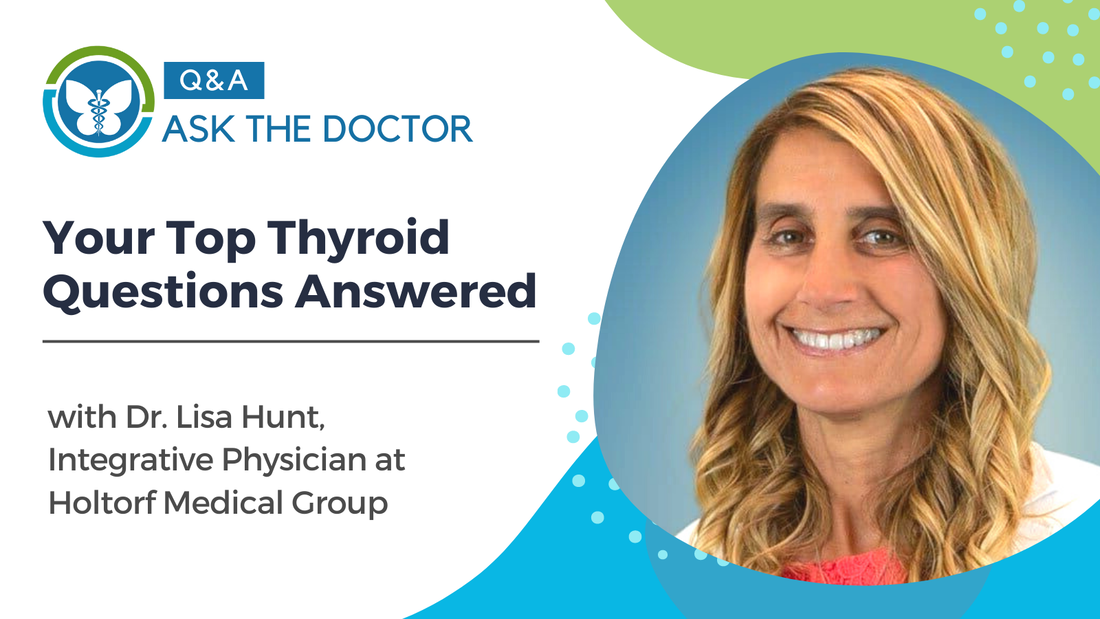
15th Jun 2022
Your Top Thyroid Questions Answered: Q&A with Dr. Lisa Hunt of Holtorf Medical Group
I had the pleasure of speaking with Lisa Hunt, D.O., an integrative physician at Holtorf Medical Group (www.holtorfmed.com) in El Segundo, CA a short while ago. I polled my audience and your top thyroid-related questions are answered here by Dr. Hunt. Dr. Hunt is a board-certified integrative physician and has extensive experience in thyroid health, hormone replacement, immune dysfunction and chronic conditions.
Read Article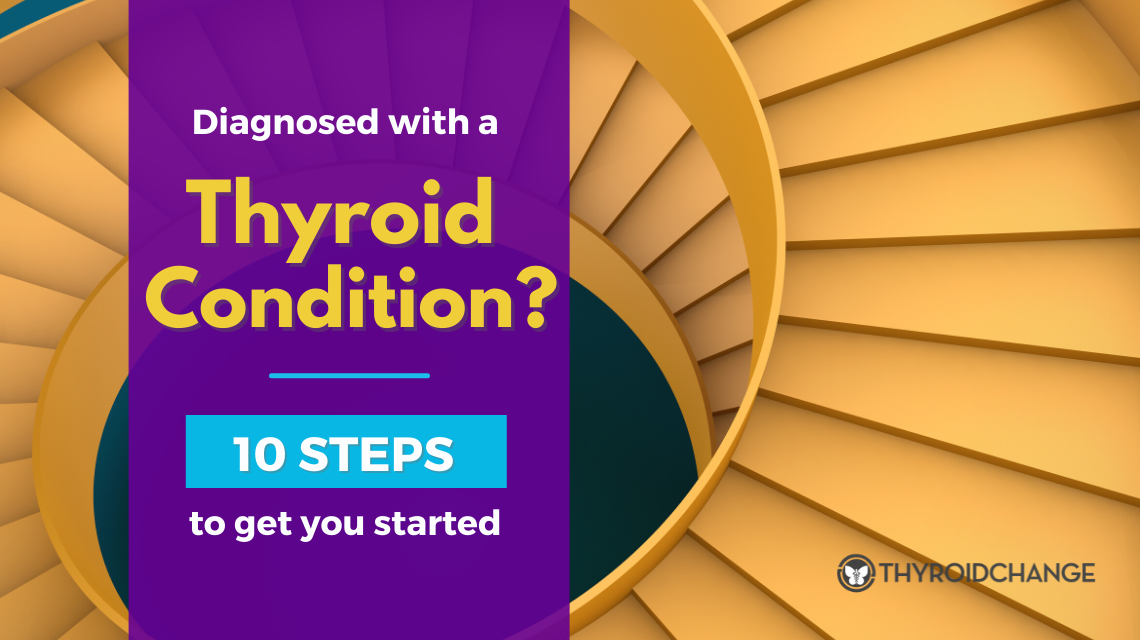
15th Jun 2022
Diagnosed With a Thyroid Condition? 10 Steps to Get You Started
Pursuing proper treatment and an overall healthy lifestyle that includes eating well and exercising can help you manage a thyroid condition. But what else can you do to live well with and thrive with your condition? The information can be overwhelming and Annabel Bateman, thyroid health advocate and author, has created this guide to walk you through essential lifestyle tips once you have been diagnosed.
Read Article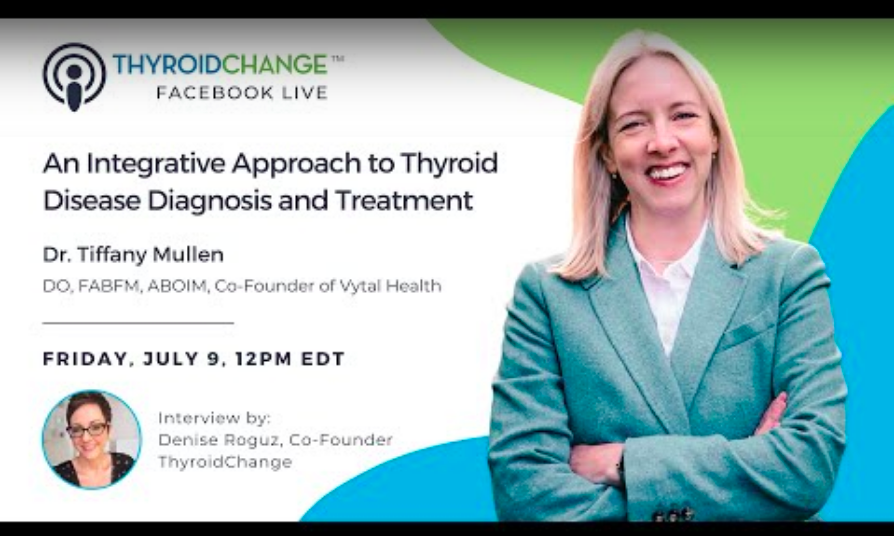
15th Jun 2022
Why Is Integrative Thyroid Care Essential? Q&A with Dr. Tiffany Mullen of Vytal Health
Tune in and listen to Denise Roguz of ThyroidChange interview integrative practitioner and hormone expert, Dr. Tiffany Mullen, DO, FABFM, ABOIM, and Co-Founder of integrative telemedicine company, Vytal Health (www.vytalhealth.com). You will learn why functional medicine is essential for many thyroid patients and how can it make a difference for you. The audience’s pressing thyroid questions are answered by Dr. Mullen at the end of the talk. What would you like to know?
Read Article